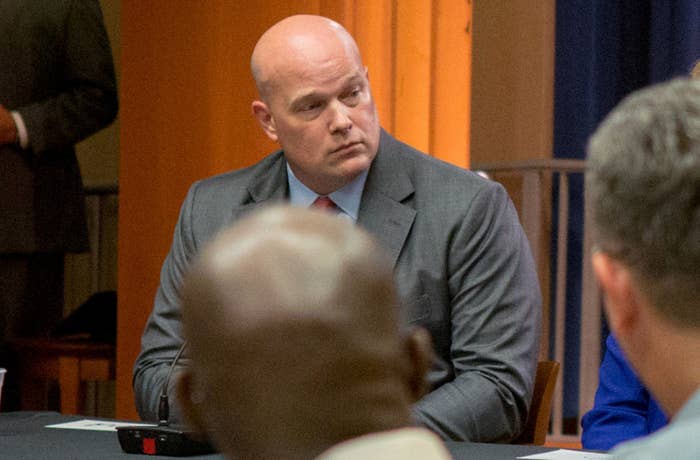
The day after the midterm elections, President Donald Trump’s chief of staff told Jeff Sessions, who the Senate confirmed to serve as attorney general in February 2017, to resign — that day. Sessions’ own chief of staff, Matthew Whitaker, would be named acting attorney general.
That basically was the high point for Whitaker, as almost every news cycle since has included new questions about whether he should be in the job — questions about the legality of his appointment but also about his qualifications.
On Friday night, the Washington Post declared, “There is no way this man should be running the Justice Department.” On Saturday, George W. Bush’s former attorney general, Alberto Gonzales, questioned Whitaker’s appointment to NPR, saying it “confounds” him. By Sunday, the editor of the conservative Free Beacon called Whitaker “one of our lesser qualified attorney generals, if I can be charitable.”
And, in as clear a sign as any in the Trump era that Whitaker had lost control of the narrative, the acting attorney general locked down his wide-ranging, opinionated Twitter account on Friday to hide it from public view.
So, what happened?
The first question is: How was Whitaker appointed? Unlike for many positions, the White House never put out a formal statement announcing his appointment. Trump simply tweeted the news.
We are pleased to announce that Matthew G. Whitaker, Chief of Staff to Attorney General Jeff Sessions at the Department of Justice, will become our new Acting Attorney General of the United States. He will serve our Country well....
By law, Deputy Attorney General Rod Rosenstein is the No. 2 at the Justice Department — the first deputy, as federal law references. Under a 1988 law, if a federal officer “dies, resigns, or is otherwise unable to perform the functions and duties of the office,” the first deputy becomes the acting officer by default.
But there are other options.
The president, under a 1998 law called the Federal Vacancies Reform Act (FVRA), is given other options. The president — and only the president — can name any other Senate-confirmed individual in the government as the acting officer. The law also authorizes the president to name a person as the acting officer if they serve within the agency in question at a high-ranking level and have been there for more than three months, even if the position does not require Senate confirmation.
Under the law, then, Whitaker, who has been serving as Sessions’ chief of staff for more than a year, would be eligible to serve as the acting attorney general under that final provision.
Don’t forget the Constitution!
That’s not the end of the matter, though. Under the Constitution, certain executive positions must be filled by people who receive the advice and consent of the Senate.
The Constitution states that the president “shall nominate, and by and with the advice and consent of the Senate, shall appoint … officers of the United States.” It goes on to say that Congress can pass laws to allow either the president, courts, or the heads of departments to appoint “inferior officers,” officials who are answerable to someone else (besides the president) and do not need to be confirmed by the Senate.
The question, then, comes down to whether someone “perform[ing] the functions and duties” of an officer in an acting role under the FVRA is an officer — in which case the Constitution requires Senate confirmation — or is a type of “inferior officer” who can be authorized by the Congress.
Bring in the lawyers.
That question has led to several days of debate over whether Whitaker can serve as acting attorney general.
In the New York Times, Neal Katyal, who served as acting solicitor general in the Obama administration, and George Conway, a conservative lawyer who has clashed with Trump even as his wife Kellyanne defends the president, argued that the Constitution requires Senate approval for Whitaker to take on the job, even temporarily. They, and others, point to a 2017 opinion by Justice Clarence Thomas in which he detailed his view that the Appointments Clause lays out the “exclusive process” for appointing officers.
The case involved whether an individual could serve as “acting general counsel” to the National Labor Relations Board (NLRB) without having been confirmed by the Senate. Although the majority ruled that the service was not permitted under the 1998 law, Thomas went further, noting that the dissenting justices believed the service was allowed under the FVRA, setting up what he called “grave constitutional concerns” because, as he wrote, “the Appointments Clause forbids the President to appoint principal officers without the advice and consent of the Senate.”
In their op-ed, Katyal and Conway concluded, “What goes for a mere lawyer at the NLRB goes in spades for the attorney general of the United States, the head of the Justice Department and one of the most important people in the federal government.”
Steve Vladeck, a law professor at the University of Texas, disagreed, pointing to a much older case — from 1898 — that detailed how the Supreme Court resolved a question about whether a vice consul in then-Siam, who was not confirmed by the Senate, was properly authorized to take on the duties of the consul temporarily due to the consul’s illness. In that situation, the court held that the appointment was permitted.

“Because the subordinate officer is charged with the performance of the duty of the superior for a limited time, and under special and temporary conditions, he is not thereby transformed into the superior and permanent official,” Justice Edward White wrote for the court.
Vladeck pointed to that decision as evidence that the Supreme Court has allowed Congress to pass laws that allow people not confirmed by the Senate to take on temporary, “acting” titles without needing to be confirmed by the Senate.
“For better or worse, Congress in 1998 authorized the president to name agency officials not confirmed by the Senate, like Mr. Whitaker, to exercise the functions even of cabinet officials on an acting, time-limited basis, whether or not Senate-confirmed officials were available,” he concluded.
Others pushed back, claiming that the circumstances were substantially different: The times were different, the posting was halfway across the globe, an immediate illness was at issue, and no other Senate-confirmed individuals were on site. Still others backed up Vladeck’s point, noting that the first vacancies statute — from way back in 1792 — allowed the president to appoint acting cabinet members when necessary without Senate approval and no set time limitations.
The legal back-and-forth has, if nothing else, illuminated that, at best, the legality is not certain insofar as this provision in these circumstances has never been tested in court.
Unsurprisingly, Trump also weighed in.
“A big complaint people have, Mueller was not Senate confirmed, so he’s doing a report. He wasn’t Senate confirmed. Whitaker was Senate confirmed, and he doesn’t need this, but he was Senate confirmed at the highest level when he was the US attorney from Iowa,” Trump told reporters on Friday.
It’s not clear whether anyone with a legal background recommended this path. It's also not clear whether anyone thinks that Whitaker’s confirmation as a US attorney back in the George W. Bush administration — a position he left in 2009 — “carries over” for the nearly decadelong period he was not working for the federal government and makes his appointment legal now. Just as irrelevant, but nonetheless amusing in light of Trump’s comments, Mueller had actually been confirmed more recently than Whitaker. In 2011, the Senate confirmed Mueller unanimously for a special two-year term as FBI director.
So, who could resolve this question?
Well, the courts, of course.
But, in order for the courts to do so, someone with standing to bring a challenge would have to do so. Standing is the legal requirement that you, specifically, are harmed by the claimed action — in a way more precise than just disagreeing with it.
An example of someone who could have standing would be a person who is the subject of litigation specifically authorized by Whitaker. Another person who could bring litigation would be a person directly affected by a federal regulation put into effect by Whitaker. (While the recent asylum changes might immediately come to mind, that was a joint rule by Whitaker and Homeland Security Secretary Kirstjen Nielsen, and the proclamation came from Trump, so the legal issues there would be far less clear than if Whitaker, on his own, were to issue a regulation solely for the Justice Department.) Another person potentially with standing would be a little more indirect: If the acting attorney general appoints a person to a position under some statutory authority, and that appointee then takes action against an individual, that individual could sue and assert that the appointee was not validly appointed because Whitaker was not validly serving as acting attorney general.
Another possible lawsuit could come from senators, who — they would argue — have been kept out of the constitutional process that must come before Whitaker can take on the “functions and duties” of the attorney general. Reuters reported that Senate Democrats are considering litigation to that end.
Of course, that’s not all.
Basically since the moment Trump named Whitaker acting attorney general, questions have been raised about whether he should recuse himself from matters involving Trump or, at least, from overseeing the Mueller investigation.
On Sunday, asked about the various areas where questions have been raised about Whitaker’s possible recusal, Justice Department spokesperson Kerri Kupec told BuzzFeed News, “Acting AG Whitaker is fully committed to following all processes and procedures of the Department of Justice, including meeting with ethics officials on his oversight responsibilities, matters that may warrant recusals, etc.”
So, what are those areas?
Mueller: Whitaker has been an aggressive and outspoken opponent of the Mueller investigation. He questioned the Russia investigation itself before the special counsel was appointed, has taken aim at Mueller’s moves as special counsel, and has suggested ways of diminishing Mueller’s power as special counsel — all before he took a job at the Justice Department in the fall of 2017.
Additionally, in his time in Iowa, Whitaker served as the chair of Sam Clovis’s unsuccessful 2014 campaign to be the state’s agriculture commissioner. Two years later, Clovis was on Trump’s campaign — a role that led him to be interviewed by Mueller’s office in the course of its investigation.
As with Sessions — who recused himself, to Trump’s dismay, from overseeing the Russia investigation — the question has been raised of whether Whitaker should be recused from overseeing the Mueller investigation. Over at Lawfare, several legal scholars are trying to figure out whether Whitaker is seeking ethical advice on that particular question from Justice Department officials.
Trump, writ large: The White House’s John Kelly viewed Whitaker, the New York Times reported in September, as being his “eyes and ears” at the Justice Department. Murray Waas at Vox reported this past week that Whitaker regularly met and spoke with Trump and Kelly during his time as Sessions’ chief of staff, often, per Waas, without Sessions’ inclusion.
Such extensive involvement with the White House before taking over as acting attorney general could raise questions about whether Whitaker can appropriately oversee any investigations relating to Trump or his White House.
Ongoing FBI investigation: Finally, there are recusal questions that are intermingled with broader judgment questions — matters that would have come out in any confirmation hearing, if Whitaker had been subject to such a hearing.
In addition to his writings and his interactions with Trump and the Trump White House, much has been written in the days since Whitaker’s appointment about his involvement on the advisory board of World Patent Marketing Inc., a company that shut down in the midst of a Federal Trade Commission fraud investigation but that, according to multiple reports, is the subject of an ongoing FBI investigation.

